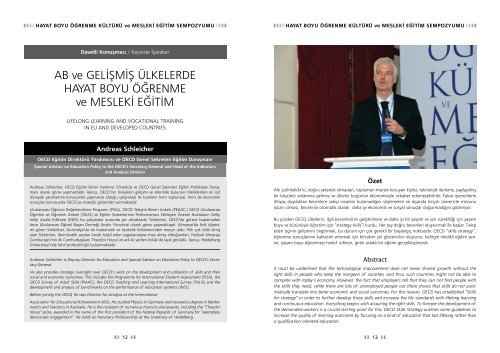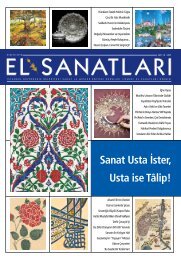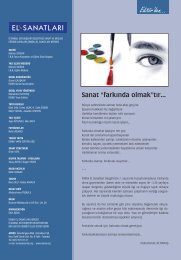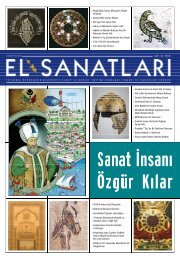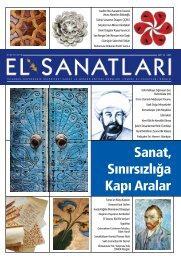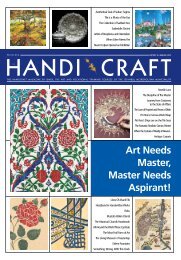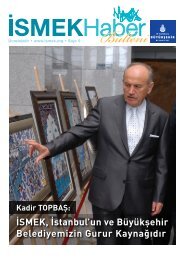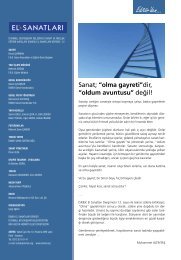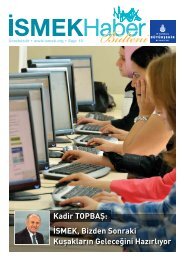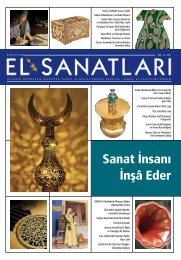HAYAT BOYU ÖĞRENME KÜLTÜRÜ ve MESLEKİ EĞİTİM SEMPOZYUMUHAYAT BOYU ÖĞRENME KÜLTÜRÜ ve MESLEKİ EĞİTİM SEMPOZYUMUDavetli Konuşmacı / Keynote SpeakerAB ve GELİŞMİŞ ÜLKELERDEHAYAT BOYU ÖĞRENMEve MESLEKİ EĞİTİM<strong>LIFELONG</strong> <strong>LEARNING</strong> AND VOCATIONAL TRAININGIN EU AND DEVELOPED COUNTRIESAndreas SchleicherOECD Eğitim Direktörü Yardımcısı ve OECD Genel Sekreteri Eğitim DanışmanıSpecial Advisor on Education Policy to the OECD’s Secretary-General and Head of the Indicatorsand Analysis DivisionAndreas Schleicher, OECD Eğitim Birimi Yardımcı Yöneticisi ve OECD Genel Sekreteri Eğitim Politikaları Danışmanıolarak görev yapmaktadır. Ayrıca, OECD’nin bireylerin gelişimi ve ellerinde bulunan niteliklerden en üstdüzeyde yararlanma konusunda yapmakta olduğu çalışmalar ile bunların hem toplumsal, hem de ekonomiksonuçları konusunda OECD’ye stratejik gözlemler sunmaktadır.Uluslararası Öğrenci Değerlendirme Programı (PISA), OECD Yetişkin Beceri Anketi (PEAAC,) OECD UluslararasıÖğretim ve Öğrenim Anketi (TALIS) ve Eğitim Sistemlerinin Performansını Etkileyen Önemli Noktaların GeliştirilipAnaliz Edilmesi (INES) bu çalışmalar arasında yer almaktadır. Schleicher, OECD’de göreve başlamadanönce Uluslararası Eğitsel Başarı Derneği Analiz Yöneticisi olarak görev yapmaktaydı. Almanya’da fizik öğrenimigören Schleicher, Avustralya’da da matematik ve istatistik bölümlerinden mezun oldu. Pek çok ödül almışolan Schleicher, demokratik açıdan örnek teşkil eden uygulamalara imza atmış olduğundan, Federal AlmanyaCumhuriyeti’nin ilk Cumhurbaşkanı Theodor Heuss’un adı ile verilen ödüle de layık görüldü. Ayrıca, HeidelbergÜniversitesi’nde fahrî profesörlüğü bulunmaktadır.Andreas Schleicher is Deputy Director for Education and Special Advisor on Education Policy to OECD’s Secretary-General.He also provides strategic oversight over OECD’s work on the development and utilisation of skills and theirsocial and economic outcomes. This includes the Programme for International Student Assessment (PISA), theOECD Survey of Adult Skills (PIAAC), the OECD Teaching and Learning International Survey (TALIS) and thedevelopment and analysis of benchmarks on the performance of education systems (INES).Before joining the OECD, he was Director for Analysis at the InternationalAssociation for Educational Achievement (IEA). He studied Physics in Germany and received a degree in Mathematicsand Statistics in Australia. He is the recipient of numerous honours and awards, including the “TheodorHeuss” prize, awarded in the name of the first president of the Federal Republic of Germany for “exemplarydemocratic engagement”. He holds an honorary Professorship at the University of Heidelberg.ÖzetAltı çizilmelidir ki, doğru yetenek olmadan, toplumun marjını koruyan kişiler, teknolojik ilerleme, paylaşılmışbir büyüme anlamına gelmez ve ülkeler bugünün ekonomisiyle rekabet edemeyebilirler. Fakat işverenlerinihtiyaç duydukları becerilere sahip insanlar bulamadığını söylemeleri ve dışarıda birçok üniversite mezunuişsizin olması, becerinin otomatik olarak daha iyi ekonomik ve sosyal sonuçlar doğurmadığını gösteriyor.Bu yüzden OECD, ülkelerin, ilgili becerilerinin geliştirilmesi ve daha iyi bir yaşam ve işin sürekliliği için yaşamboyu ve bütünüyle öğrenim için “strategy skills”i kurdu. Her şey doğru becerileri oluşturmak ile başlar. Talepeden işçinin gelişimini öngörmek, bu durum için çok gerekli bir başlangıç noktasıdır. OECD “skills strategy”,öğrenme sonuçlarının kalitesini artırmak için birtakım yol göstericiler oluşturur, belirgin nitelikli eğitim yerine,yaşam boyu öğrenmeyi hedef edinen, getiri odaklı bir eğitim gerçekleştirerek.AbstractIt must be underlined that the technological improvement does not mean shared growth without theright skills in people who keep the margeon of societies, and thus, such countries might not be able tocompete with today’s economy. However, the fact that employers tell that they can not find people withthe skills they need, while there are lots of unemployed people out there shows that skills do not automaticallytranslate into beter economic and social outcomes. For this reason, OECD has established “Skillsfor strategy” in order to further develop these skills and increase the life standards with lifelong learningand continuous education. Everything begins with acquiring the right skills. To foresee the development ofthe demanded workers is a crucial starting point for this. OECD Skills Strategy outlines some guidelines toincrease the quality of learning outcomes by focusing on a kind of education that last lifelong rather thana qualification oriented education.12 13
HAYAT BOYU ÖĞRENME KÜLTÜRÜ ve MESLEKİ EĞİTİM SEMPOZYUMUHAYAT BOYU ÖĞRENME KÜLTÜRÜ ve MESLEKİ EĞİTİM SEMPOZYUMUGünaydın. Burada olmak benim için büyük bir mutluluk.Beni bu sempozyuma ve bu güzel şehre davet edenİSMEK’e huzurlarınızda teşekkürü bir borç bilirim. Ayrıca,bu konuşmayı Türkiye’de yapıyor olmanın da benim içinbüyük bir mutluluk olduğunu belirtmek isterim. Bununsebebi, OECD olarak yaptığımız eğitim performansını ölçendeğerlendirmelerde, Polonya ile birlikte Türkiye’ninde Avrupa ülkeleri arasında eğitim sistemi en hızlı gelişimkaydeden ülke olmasıdır. Somut olarak, okullaşma sistemindebüyük ilerlemeler görülmektedir. Ayrıca, düzenliolarak yapmakta olduğumuz PESA değerlendirmelerinde,bireylerin matematik becerilerinde gözle görülür bir artışkaydedilmiştir. Bununla beraber, hayat boyu öğrenmeninönemini ve rolünü tüm bireyler nezdinde artırmak ve herkesinhayat boyu eğitimden azami düzeyde faydalanmasınısağlamak, Türkiye dâhil tüm ülkeler için zorlu bir görevdir.Bu zorluk, yalnızca bireylerin hayatları boyunca bir şeyleröğrenmelerini sağlamakla sınırlı değildir. Bu görevi zorluhale getiren esas husus, hayat boyu öğrenme algısının bireylerdekökleşmesini sağlayabilmektir ki bu bir nevi kültürdeğişimi demektir. Yaptığımız her işin önemli bir yönünün,o işten bir şeyler öğrenmek olduğu ilkesinin, bir ülkedeyaşayan tüm bireylerce benimsenmiş olması gerekir.Öğrenme, bir mekânda gerçekleşen eylemlerle sınırlı değildir.Gittiğimiz her yerde, yaptığımız her işte öğrenmesüreçleri bulunmaktadır. Başka bir değişle, öğrenmeyiformel eğitim kurumları ile sınırlandırmak doğru değildir.Bu hayat boyu öğrenme algısının kökleşmesini sağlamak,tüm OECD ülkelerinin yüzleşmesi gereken, zorlu bir görevdir.Meseleye beceri boyutundan bakmak gerekirse, becerilerinbaşarıyı da beraberinde getirdiğini söyleyebiliriz.Eğitim, beceriler ve istihdam arasında sıkı bir ilinti bulunmaktadır.Bu durum, Türkiye dâhil tüm dünya ülkeleri içingeçerlidir. Beceri olmazsa, ekonomik anlamda da ilerlemekaydetmek mümkün değildir.Aranızda, bizim okullarda okuyan öğrencilerin becerileriniölçmek için kullandığımız PESA anketimizi bilenler mutlakavardır. Artık bu anketi aynı zamanda yetişkinlerin de becerileriniölçebilecek şekilde düzenledik ve gerçekleştirdik.Bu ölçümler de becerilerimiz ile istihdam, gelir durumu gibitoplumdaki statümüzü belirleyen pek çok husus arasındasu götürmez bir doğru orantı bulunduğunu göstermiştir.Ve yine verilerimiz göstermiştir ki, hayat boyu öğrenme deönemli bir toplumsal girişim konumunda bulunmaktadır.Sağlık, sosyal katılım gibi hususlarla da becerilerimiz arasındasıkı bir bağ bulunmaktadır. Bir toplumdaki bireylerarasındaki güven de o toplumun refahı için gerekli unsurlardanbiridir ve becerilerimizle doğru orantılıdır.Bazılarımızın aklına, OECD’nin, yani ekonomiye dayalı birkuruluşun neden toplumdaki güven düzeyini ölçtüğü yönündesorular takılabilir. Fakat şunu göz ardı etmemeliyizGood morning. It is a great pleasure to be here, and Ithank ISMEK for inviting me to give a speech to the beautifulcity of İstanbul. It is also a great pleasure for meto speak in Turkey, because our indicators at the OECD,where we measure the performance on education showsTurkey together with Poland to be the most rapidly improvingeducation system in Europe. There is a lot ofprogress that we can see in the school system, and ourlatest PESA assessment showed important improvementsof the mathematics skills of people particularly. But makinglifelong learning a reality for all is a very significantchallenge for everyone including Turkey. And it’s not justabout making people learn throughout their life. It’s alsovery much a challenge of lifewide learning, insuring thatwe change the culture to make learning an aspect ofeverything we do. Learning is not a place.Learning is an activity that cuts through everything whateverwe do and wherever we go. It’s not just a questionof formal education institutions. This is a very significantchallenge for every country in the OECD. If you think aboutskills of people, we know that skills drive the successof individuals. There is a very strong link between educationand skills, as well as things such as employment,earnings. It’s true for Turkey as well. There is a very importantrelationship between skills and economic improvememt.Some of you may be familiar with our PESA survey wherewe test the skills of students in school. We have nowdone a PESA survey also for the adult population, lookingat the skills that adults have. What we see with thisis that there is a very strong relationship between theskills that we have and many attributes of life such asemployment, personal income and so on. Those thingsare very well-known and very well-established, though.ki, güven, demokrasinin temelidir. Diğerleriyle kurduğumuziş ilişkilerinin temelidir ve yalnızca bireysel özelliklerimizledeğil, hayat boyu geliştirdiğimiz becerilerle sıkı birilişkisi vardır.Verilerimiz, siyasi katılım ile becerilerimiz arasında dailişki bulunduğunu göstermektedir. Beceri düzeyi düşükolanlar, siyasetçilerin istediklerini yaptıklarına inanırlar. Becerileriyüksek düzeyde olanlar ise, her şeyin kendi kontrollerialtında olduğundan ve dilerlerse bir şeyleri değiştirebileceklerindenemindirler. Aslında bugün bu sunumlaanlatmak istediğim şey, yaptığımız ölçümlerin yalnızcaekonomik katılımcılığa ve ekonomik düzeyde elde edilensonuçlara dayanmadığı gerçeğidir. Az önce de belirtmişolduğum gibi, hayat boyu öğrenme, büyük ölçüde toplumsalbir girişimdir.Bununla birlikte, yine verilerimize dayanarak söyleyebilirizki, beceriler, mutlak surette daha iyi sonuçlar elde etmekanlamına gelmemektedir. Son yıllarda pek çok ülke bunuacı bir şekilde de olsa deneyimlemiştir. Bu noktada sizebirkaç veri göstermek isterim.Sağ tarafta, işsizlik oranlarını görmektesiniz. Sol taraftaise, aradıkları becerilere sahip çalışan bulamamaktanyakınan işverenlerin oranını görüyorsunuz. En alta baktığınızdaJaponya’yı göreceksiniz. Bana, dünyadaki en başarılıeğitim sisteminin hangisi olduğunu sorarsanız, sizebüyük ihtimalle Japonya’nın en başarılı eğitim sisteminesahip olduğunu söyleyebilirim. Japonya’da bireyler, okullardanyüksek düzeyli becerilerle donanmış olarak mezunolmaktadırlar. Pek çok kişi üniversiteye gitmektedir. Ne varki, işverenlerin % 80’i, aradıkları becerilere sahip çalışanbulamadıklarını belirtmektedirler. Bu durum Türkiye içinde geçerlidir. Eğitim düzeyi yüksek de olsa, bireylerin sahipoldukları beceriler ile ekonominin gereksinim duyduğubeceriler arasında maalesef bir ters orantı bulunmaktadır.Bu durumdan çıkarılacak en önemli ders ise, eğitiminmutlak surette olumlu ve verimli sonuç anlamına gelmeyebileceğidir.Bu soruna çözüm bulabilmek için, öncelikle, ekonomikve toplumsal anlamda olumlu sonuçlar elde edebilmehususunda ihtiyaç duyduğumuz becerilerin neler olduğunubelirlemektir. Bizim verilerimiz, bu becerilerin yalnızcaakademik becerilerle sınırlı olmadığını göstermektedir. İştetam bu noktada, meslekî beceriler devreye girmektedir.İnsanlara, dünya ile etkileşim kurmak için verebileceğinizbecerilerin en önemlileri arasında bulunmaktadır meslekîbeceriler. İkinci olarak, gereken becerileri doğru şekildenasıl harmanlayacağımız üzerinde kafa yormamız gerekir.Çünkü akademik becerilerle meslekî becerileri dengelişekilde harmanlamanın önemi büyüktür. Piyasanın, bireylerinyeteneklerini ne şekilde kullanacağı hususunda daOur data also show that lifelong learning is very mucha social enterprice. You can see a relationship betweenhealth and skills. You can see a relationship between socialparticipation and skills. You can see a relationshipbetween trust in societies and skills. Now you may askme “well, why does the OECD, an economic organisationmeasure the trust between people?” But you know, trustis the foundation of democracies. Trust is the foundationfor every business relationship, and we can see that it’snot an attribute that we have as individual people, butit is something that is related to the skills we developthroughout our lives. We can see a relationship betweenpolitical participation and skills. People with poor skillsbelieve that politicians do whatever they want. Peopleat the high end of the skill distribution, though, believethat they are in control of things, that they can changeand improve things. So one point I want to make surewith my presentation today is that this is not just abouteconomic participation and outcomes. Lifelong learningis very much a social enterprice.But we also see that skills do not automatically translateinto better outcomes. That’s one of the bitter lessonsthat many countries are learning in the very years. I’llshow you just one piece of data: On the right hand side,you can see the rate of unemployment. But on the leftside you can see the number of employers who say thatthey can not find people with the skills they need. Andif you look at the bottom line, you will see Japan. If youwould ask me “what is the most successful educationsystem in the world?”, Probably Japan. People leave schoolwith high qualifications in Japan. Many people g otouniversity. But as you can see, 80% of the employers tellus “We can not find the people with skills we need”. Andthat’s true also for Turkey. You can see a fair share ofemployers saying this. There is a lot of education and alot of improvement, but there is a mismatch betweenthe skills that education provides and the skills that areneeded by our economy. A very very important lesson:Education doesn’t automatically translate into outcomes.What we need to do first of all is to figure out what arethose skills that drive economic and social outcomes. Ourdata show that this is not just about academic skills. Thisis very much the story of vocational skills, giving peoplethe tool to interact with the world.We then need to think about how can we provide theright mix of skills, and the right mix between academicand vocational qualifications. How can we ensure thatour labor markets actually use the talents? I’m going totalk a lot about it today, because it’s a very importantaspect.14 15


